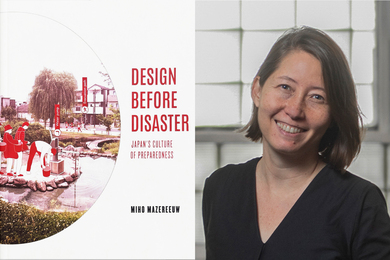An exciting development in neuropharmacology that may point to a new means of treating depression and anxiety was presented by Merck scientists Nadia Rupniak and Mark Kramer to an overflow audience at the Whitehead Institute's McGovern Auditorium at the Merck Spring Symposium on April 1.
The discovery centers around substance-P antagonists. Substance P is a short peptide produced by the limbic system and other regions of the brain. This peptide is highly conserved among organisms, but its functions in the brain are poorly understood.
Dr. Rupniak, a Merck senior research fellow, said she and colleagues at Merck discovered that an antagonist of substance P's interaction with its cell surface receptor would reduce both anxiety and stress responses in gerbils. For example, gerbils that live in colonies in the ground thump with a hind paw to warn of impending danger, such as predators. Injection of substance P induces this response, while Merck's new class of compounds inhibits this response. The compounds also suppress the anxiety of gerbil pups who are separated for a short time from their mothers.
Dr. Kramer, a Merck senior research physician, presented the first public discussion of the results of a recent clinical trial using antagonists of substance P. The trials were a blind test of the drug to treat patients with both depression and anxiety. There was a statistically significant beneficial effect in the treated patients as compared to those receiving a placebo.
Last week's spring symposium was the second since the January 1997 inception of an agreement between pharmaceutical giant Merck & Co., Inc., and MIT to further Merck's interest in "recruiting the best possible scientists and engineers" and in basic research that may lead to new pharmaceutical and biotech products.
In addition to specific research projects, the Merck/MIT collaboration supports postdoctoral and graduate fellowships. MIT hosts two symposia each year, where Merck visitors have the opportunity to interact with MIT personnel and hear presentations on their ongoing work. The first was held in October 1997.
Attendees this time included Merck/MIT collaboration managers Professor Phillip Sharp, chair of the biology department, and Dr. Edward Scolnick, president of Merck Research Labs and executive vice president of science and technology for Merck. Other MIT speakers were Sara Dempster and Chuan He, graduate fellows in chemistry; Cheuk-san (Ed) Wang, graduate fellow in electrical engineering and computer science; Professor of Mathematics Daniel Kleitman; Tod Smeal, a postdoctoral fellow in biology; David Sabatini, a Whitehead fellow; Assistant Professor of Biology Peter Sorger; Joydeep Goswami, a graduate fellow in chemical engineering; Assistant Professor of Biology Ilaria Rebay, who also is a Whitehead associate member. Thirty-two researchers and scientists/managers from Merck also took part.
A version of this article appeared in MIT Tech Talk on April 8, 1998.





